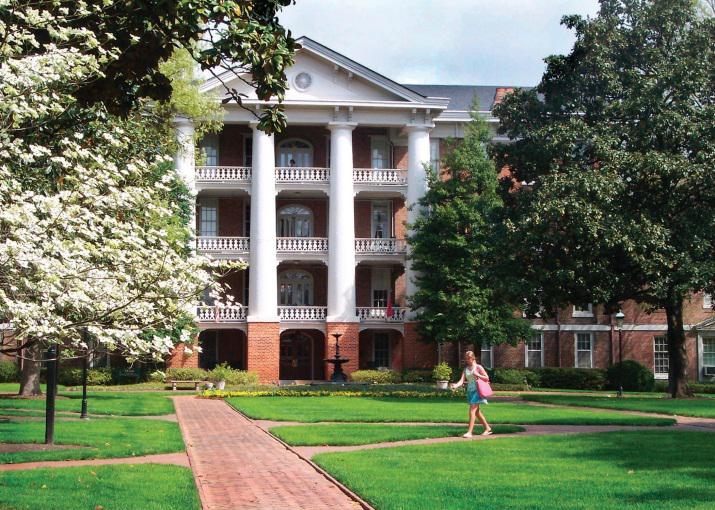NASK (Nord-Amerika Somera Kursaro de Esperanto) presents a short session, this time in the heart of beautiful Raleigh, North Carolina’s capital city. Arrive on June 26th and depart on July 5th—for eight days of learning, fun and exploring the city’s wonderful museums, varied restaurants and shopping, and various seats of government, all within walking distance of the Peace campus.
Founded in 1857 as Peace Institute, offering education for boys and girls in primary grades and to women from high school to college, the school is named in honor of William Peace, a Raleigh businessman and church elder, who pledged $10,000 to the Rev. Joseph M. Atkinson in trust for the First Presbyterian Church. The gift was used to establish Peace Institute.
The Civil War interrupted construction of the University’s Main Building (pictured above) when it was used by the Confederate government as a military hospital. After the war, the Federal government used Main as the North Carolina headquarters for the Freedmen’s Bureau, which helped former slaves establish new lives, and it is for this role in the Federal government that the building is named on the National Register of Historic Places. Peace Institute opened in 1872 and by 1940, Peace offered an academic program for young women that encompassed the last two years of high school and the first two years of college. Peace College, which, by the 1980’s had become a junior college for women entirely, transitioned into a four-year baccalaureate degree-granting institution during the mid-1990s, awarding its first baccalaureate degree in 1996. Additionally, Peace began offering coeducational evening courses through the William Peace School of Professional Studies in 2009.
In 2011, the Board of Trustees voted to transition the institution from single-gender to coeducational and rename the institution William Peace University.
NASK students will reside in an air-conditioned residence hall within one to two minutes walking distance of the classroom building, and will share a four-person suite: two participants per bedroom share a restroom. A linen package will be provided to all guests which includes two flat sheets (twin-sized bed), light blanket, pillow, two towels, two washcloths, small disposable cup and small soap. It is recommended that guests bring comfort items such as small reading lamp, alarm clock, heavier blanket or quilt, if desired, and clothes hangers. The residence hall contains a comfortable lounge on each of its three floors with a television and upholstered seating, and a kitchen with refrigerator and microwave is located on the first and third floors. The residence hall is equipped with complimentary laundry facilities, also.
Complimentary access to the Internet is available via the University’s wireless guest network throughout campus. The dining hall is a pleasant one-minute walk from the residence hall and classroom building, and the caterer serves a variety of delicious options at each meal from which to choose. Vending machines located around campus are coin-operated and offer a variety of snacks and Coca-Cola beverage products.
The international team consisting of István Ertl (Hungary), Derek Roff (U.S.), and Lee Miller (U.S.) will provide three levels of instruction. Hoss Firooznia will serve as an assisting teacher and will organize extracurricular activities.
This year, students can remain after NASK in order to participate in the Esperanto-USA convention July 5-8th (same classroom building and residence hall). If you would like to participate in the Esperanto-USA convention, please be sure to make the necessary arrangements at www.esperanto-usa.org
The general fee for NASK 2013 (courses, lodging and meals) is: US$ 625.00 until March 22nd, and US$ 675.00 thereafter. Locals not needing housing have the option of US$320 course fee only with lunch or US$250 course fee only with no meals. Scholarships are available for full-time students and teachers, and also for residents of Latin America.
Please contact Ellen M. Eddy, the administrator, at eddyellen@aol.com. For more information, please visit http://esperanto.org/nask/.
William Peace University’s mission is to prepare students for careers in the organizations of tomorrow. On average, more than 90 percent of the university’s graduates are placed in jobs or graduate school within one year of graduation.

